PhD program
Doctoral thesis projects currently in progress within the unit
Maelis Brito, Ph D student
Papna Ma, Ph D student
Feras Oyoun, Ph D student
Pauline Chavrier, Ph D student
Ghadir Kalot, Ph D
Sarah Diakhaby, Ph D student
Corentin Joulain, PhD student
Veronica Ianno’, Ph D student
Maelis BRITO : Development of nanoparticles for topical ophthalmic application in the treatment of retinal diseases
Team : Vector
PhD supervisor : Vincent Boudy
Cifre grant UNITHER
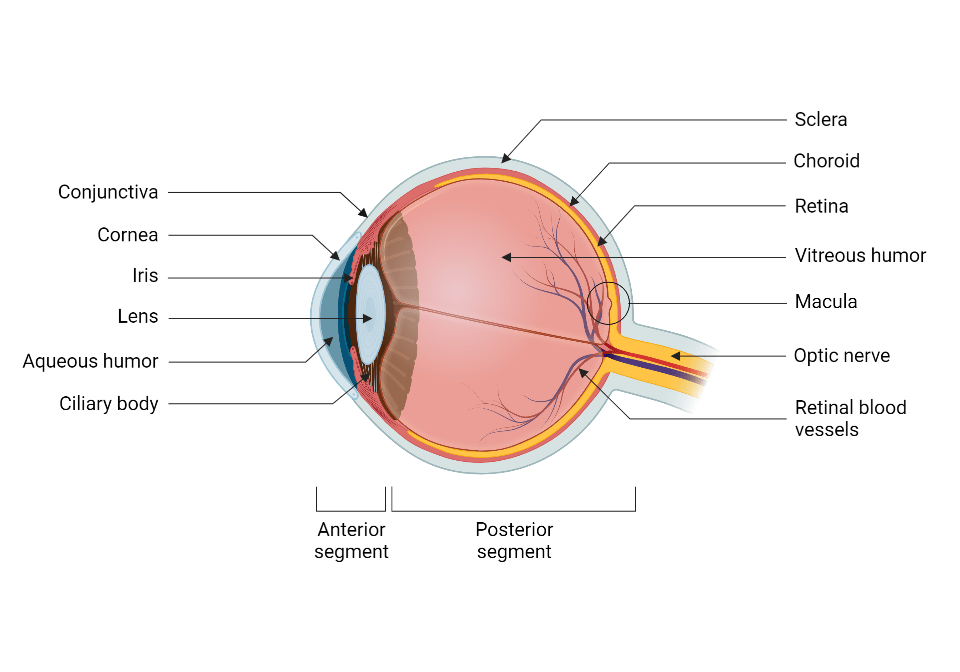
Retinal pathologies are diseases affecting the posterior segment of the eye, an area that is difficult to access for treatment. Intravitreal injections are preferred because they directly target the area of interest. However, this highly invasive mode of administration leads to rare but serious side effects and is a heavy burden for patients, who stop their treatment early. It is therefore essential to look at other less invasive ocular delivery routes. This project focuses on the development of nanostructured lipid carriers, nanocapsules and nanoemulsions for topical ocular application (eye drops). The selected raw materials allow, by increasing the residence time at the cornea, by solubilizing more the active ingredients and by promoting the corneal absorption, to optimize the ocular bioavailability and to reach the retina.
Key words: nanoparticles, bioavailability improvement, ocular application, retina.
Pauline CHAVRIER : Liposomes to treat diseases in pregnant women
Team : Vecteur
Thesis supervisor: Karine Andrieux
Grant : Inserm-Pfizer Innovation France
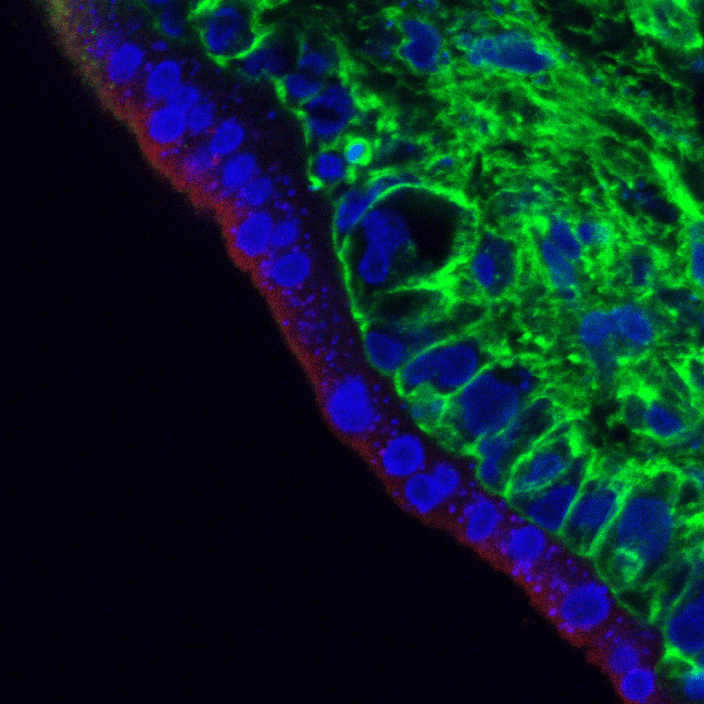
Pre-eclampsia is a disease of the pregnant woman due to placental dysfunction that is characterized by proteinuria and high blood pressure. This disease can lead to serious complications for the mother such as HELLP syndrome, or cerebral hemorrhage. The only treatment currently available is placental delivery, which can lead to a large or very large prematurity for the baby. This thesis project aims to develop a liposome-based treatment to allow delivery outside the period of extreme prematurity. Liposomes are nanoparticles made of lipidic bilayers. In this project, they are complexed with genetic material capable of blocking the expression of the sFlt-1 protein which is involved in the complications of preeclampsia. To ensure optimal delivery to the placenta and reduce the risk of toxicity to maternal organs, these liposomes are also functionalized with a ligand that can specifically recognize a receptor in the placenta.
Microscopy image showing the interaction between fluorescent liposomes (in red) with the human placenta (in blue the nucleus, in green the actin)
Sarah DIAKHABY: Identification and characterization of new inhibitors of the immune checkpoint lymphocyte activation gene 3 (LAG-3).
Team: Vector
Thesis director : Nathalie Mignet , Co-supervisor : Johanne Seguin
Grant: MTCI doctoral school
Project funding: Ligue contre le cancer
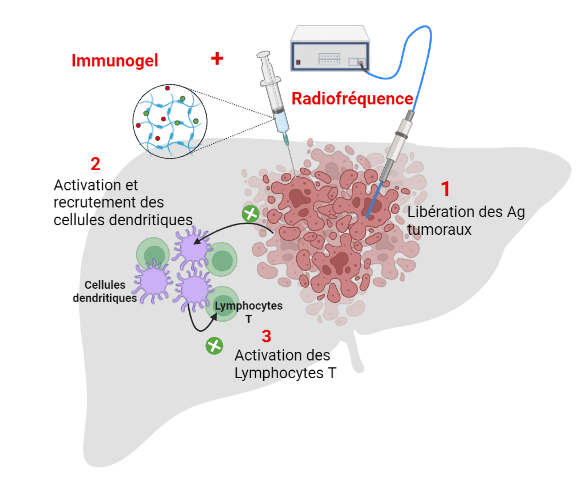
Immune checkpoints are important molecules in the control of tumor growth. Currently in the clinic, antibodies directed against these surface molecules are used to treat patients in combination with traditional therapeutic strategies. In this project, we propose to identify inhibitory peptides to replace these antibodies which have many drawbacks. Indeed, they are difficult to produce, are expensive and are rapidly eliminated in the bloodstream. To select these peptides we will use an original technique called Pepscan. The identified peptides will then be tested on cellular models. Finally, a proof of concept of the efficacy of these peptides will be performed in animals in the context of a colorectal cancer liver macrometastasis model.
Key words: Cancer, immune checkpoint, inhibitors, therapy, diagnosis, imaging.
Marion HECKMANN – Identification of new targets for the development of anti-fibrotic drugs for the treatment of chronic liver diseases
Team: Biotherapy
PhD supervisor: Virginie ESCRIOU, Co-supervisor: Céline HOFFMANN
Grant : Doctoral school MTCI, Paris Cité University (Funding 2021-2024)

Figure: The different hepatic cell types and their organization in a healthy liver and in a fibrotic liver (after Friedman. J. of Hepatol., 2003)
Hepatic fibrosis is a consequence of chronic liver diseases such as metabolic liver diseases, viral hepatitis and alcoholism, which can evolve into cirrhosis or even hepatocarcinoma. During fibrosis, the liver parenchyma undergoes remodeling characterized by an excessive accumulation of extracellular matrix (ECM) mainly composed of collagen fibers. To date, there is no anti-fibrotic drug on the market. Among the liver cells, hepatic stellate cells play an important role in the establishment of fibrosis. The Biotherapy team has demonstrated the existence of a subpopulation of hepatic stellate cells called “hypertrophied” because of their excessive storage of retinoids and has shown a link between the presence of these hypertrophied cells and fibrosis (read the article).
This thesis project focuses on hypertrophied hepatic stellate cells. The objectives are first to develop the purification of these cells, in order to characterize them by comparing the RNAs expressed by these cells with the hepatic stellate cells present in a healthy liver. Transcripts differentially expressed by hypertrophied hepatic stellate cells may represent potential targets for the development of anti-fibrotic agents.
Corentin JOULAIN : Evaluation and characterization of digestive homeostasis perturbations induced by erythropoietin
Team : Immunology
Thesis supervisors :Salima Hacein-Bey-Abina and Guillaume Sarrabayrouse
Grant : Doctoral school HOB
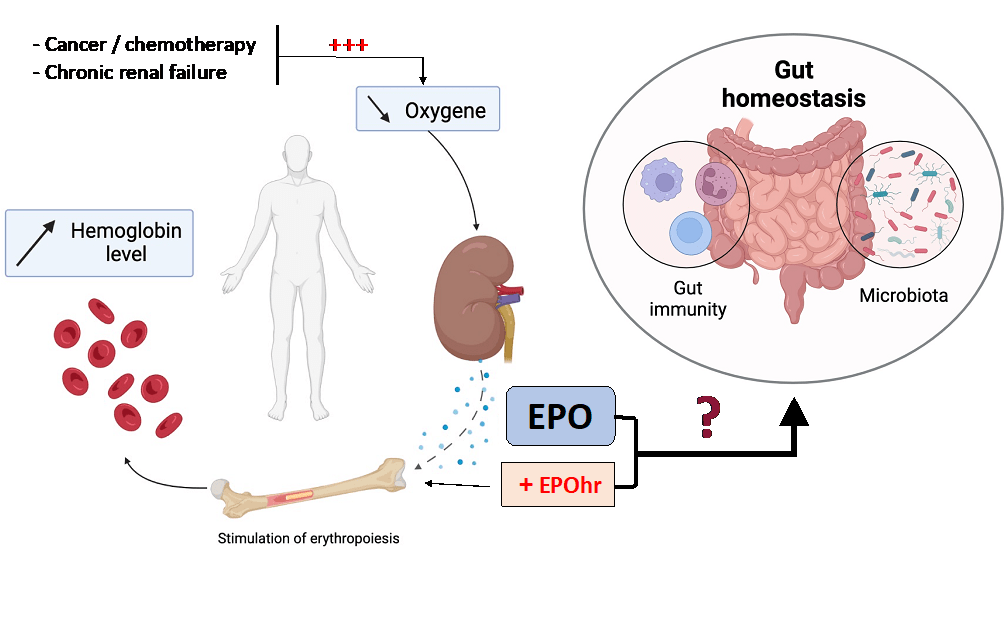
Erythropoietin (EPO) is a hormone produced naturally by the body to induce the production of red blood cells by the bone marrow. In pathological contexts such as cancer or chronic renal failure, patients may develop anemia. To correct this red blood cell deficiency, patients can be treated with recombinant human EPO (EPOhr). Since the expression of the EPO receptor is not restricted to erythroid tissue, this hormone has pleiotropic properties, which have led to side effects described in some patients. The understanding of the mechanisms leading to the appearance of pleiotropic effects of this hormone in physiological or pathological conditions represents one of the research axes of the Immunology team. Indeed, there is little data describing the impact of this hormone on the digestive tract and we know today that this organ, which houses the intestinal microbiota, contributes in a major way to the health of individuals. A pilot study conducted in the laboratory on a mouse model showed that EPO treatment impacted the frequency of intestinal immune populations as well as the stability of the fecal microbiota. These results paved the way for my PhD project which aims to describe and characterize the impact of EPO on digestive immunity and the intestinal microbiota and to identify the relationships between these two compartments.
Keywords: Erythropoietin, microbiota, immunology, intestinal homeostasis
Mitta PIERRE – Development of CXCR1/CXCR2 receptor inhibitor nanoformulations for the treatment of AMD
Team: Biotherapy
Supervisor: Pr Christine CHARRUEAU
Grant : Doctoral school MTCI, Université Paris Cité

Age-related macular degeneration (AMD) is the leading cause of blindness in industrialized countries in people over 55 years of age. It is a central retinal disease with a complex pathophysiology, including chronic inflammation and neoangiogenesis, responsible for the death of macular photoreceptors in the atrophic form and the appearance of macular neovessels in the neovascular form. These macular lesions are clinically manifested by a central and very disabling amputation of the visual field. Currently, only the neovascular form has a restrictive and expensive palliative treatment by regular intravitreal injections of anti-VEGF (Vascular Endothelial Growth Factor).
The objective of our project is to develop nanoformulations of molecules with dual anti-inflammatory and anti-angiogenic activity, such as CXCR1/CXCR2 receptor inhibitors, to promote their delivery to the posterior segment of the eye by a non-invasive and non-traumatic topical route for the treatment of AMD.
Tessa Reinert : Development of an analytical method for the multi-characterization of infliximab in the treatment of Crohn’s disease
Team : Vector
Thesis supervisors :Yannis Francois, Rabah Gahoual and Pascal Houzé
Grant :ANR
Crohn’s disease affects many people and results from a chronic inflammation of the digestive tract. Monoclonal antibody treatments, such as infliximab, allow to regulate this inflammation by inhibiting the responsible cytokine. Nevertheless, treated patients show different clinical responses, underlining the diversity of the biological activity of these antibodies without providing a formal interpretation regarding their causality. In order to better understand the clinical responses of patients and to adapt their treatment, it is important to follow up patients after administration of the antibody on several criteria, such as its pharmacokinetics, its structural modifications or its immunogenicity. This thesis project focuses on the development of new analytical methods using capillary electrophoresis coupled to mass spectrometry for the multi-characterization of infliximab after administration in a patient. The analytical method allows the quantification of this biotherapy in a specific manner, the identification of structural modifications induced in the patient’s blood, and the quantification of immunogenic reactions produced in response to this treatment. This strategy could help physicians to more rapidly adapt the clinical treatment of their patients.
Monica Swetha Bosco : Fingerprint approach using macrocyclic “chemical nose” sensors – Application in prediction of outcomes in PreeclampsiaI
Equipe : Vecteur
Directrice de thèse : Nathalie Eilstein
Bourse : ANR – PEfingerprint
Financement du projet : Ligue contre le cancer
Sensors play an integral role in everyday life, especially in the field of healthcare for the purpose of disease diagnosis and drug discovery. ‘Chemical nose’ is one such array-based sensing strategy that utilizes synthetic molecules to mimic the functioning of the human olfactory system. The chemical nose array of cross-reactive chemical receptors interacts non-specifically with each analyte to provide a unique fingerprint of outputs. Pattern recognition facilitated by statistical analysis and machine learning algorithms ultimately result in analyte classification and identification.
This doctoral project focuses on developing such a fluorescence-based sensor array using macrocyclic host-guest interactions. Further, as biomolecular composition of body fluids provide a reflection of disease severity and progression and array based sensing is highly efficient in detecting small changes in complex mixtures, the developed sensors are being leveraged in this project to enable serum-based diagnosis of the diseased state of Preeclampsia so as to enable application in patient outcome predictions.
Latest thesis projects (2023-2024-2025)
Maryame BERKANI: Development of an LC-MS/MS approach for the structural and functional analysis of therapeutic antibodies
Team: Vector
Thesis supervisor: Rabah GAHOUAL
Funding: MTCI doctoral school scholarship
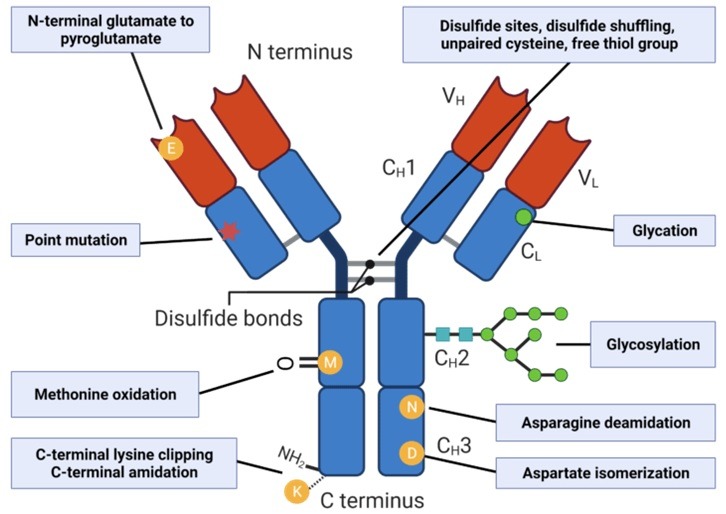 Monoclonal antibodies (mAbs) have become major biotherapeutic agents, particularly in the fields of oncology and autoimmune diseases. Despite their efficacy and specificity, variability in response is observed in patients, linked to differences in clearance or the development of anti-drug antibodies. In addition, mAbs can undergo post-translational modifications (PTMs) that can alter their biological properties, particularly their affinity for the antigen or receptors involved in their effector functions.
Monoclonal antibodies (mAbs) have become major biotherapeutic agents, particularly in the fields of oncology and autoimmune diseases. Despite their efficacy and specificity, variability in response is observed in patients, linked to differences in clearance or the development of anti-drug antibodies. In addition, mAbs can undergo post-translational modifications (PTMs) that can alter their biological properties, particularly their affinity for the antigen or receptors involved in their effector functions.
This project aims to develop various innovative analytical strategies based on mass spectrometry (LC-MS/MS), coupled with competitive affinity experiments performed directly in biological matrices. This approach will enable the impact of PTMs on the affinity of mAbs for their targets to be measured accurately, while also characterizing their structures in detail.
Keywords: monoclonal antibodies, mass spectrometry, LC-MS/MS, post-translational modifications, affinity, protein-protein interactions
Joanna DUFFRENE: Microfluidic production and biological evaluation of lipid nanoparticles for mucosal delivery of mRNA
Team: Vector
Thesis supervisor: Nathalie MIGNET
Co-supervisor: Khair ALHARETH
Grant: ANR (PEPR Biotherapy/Bioproduction)
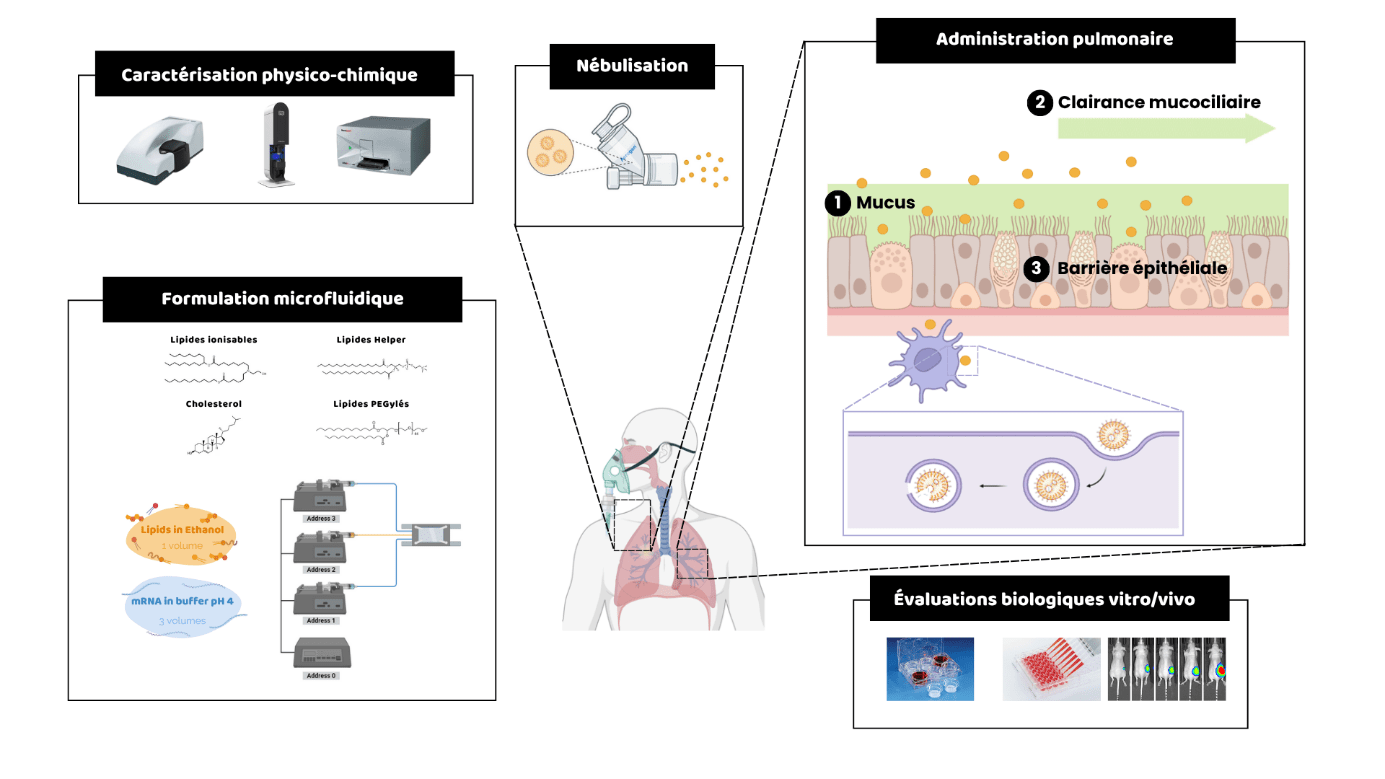 The success of messenger RNA (mRNA) vaccines against SARS-CoV-2 has confirmed the therapeutic potential of mRNA and the efficacy of lipid nanoparticle (LNP)-based formulations. However, these vaccines have certain limitations, including the short duration of the immune response they induce, requiring frequent boosters, as well as their inability to prevent infections in vaccinated individuals. As part of the RNAvac project, this thesis work aims to develop a new generation of mRNA vaccines designed for mucosal administration via the lungs. To this end, new LNPs optimized for this route of administration will be produced by microfluidics, then subjected to in-depth physicochemical characterization and biological evaluation.
The success of messenger RNA (mRNA) vaccines against SARS-CoV-2 has confirmed the therapeutic potential of mRNA and the efficacy of lipid nanoparticle (LNP)-based formulations. However, these vaccines have certain limitations, including the short duration of the immune response they induce, requiring frequent boosters, as well as their inability to prevent infections in vaccinated individuals. As part of the RNAvac project, this thesis work aims to develop a new generation of mRNA vaccines designed for mucosal administration via the lungs. To this end, new LNPs optimized for this route of administration will be produced by microfluidics, then subjected to in-depth physicochemical characterization and biological evaluation.
Keywords: mRNA vaccines, lipid nanoparticles, microfluidics
Oriane LE GOAS: Development of an innovative therapeutic nanovector targeting the placenta to treat foetal arrhythmia
Team: Vector
Thesis supervisors: Karine Andrieux (UTCBS) and Florence Gazeau (NABI)
Grant: StratEx, Université Paris Cité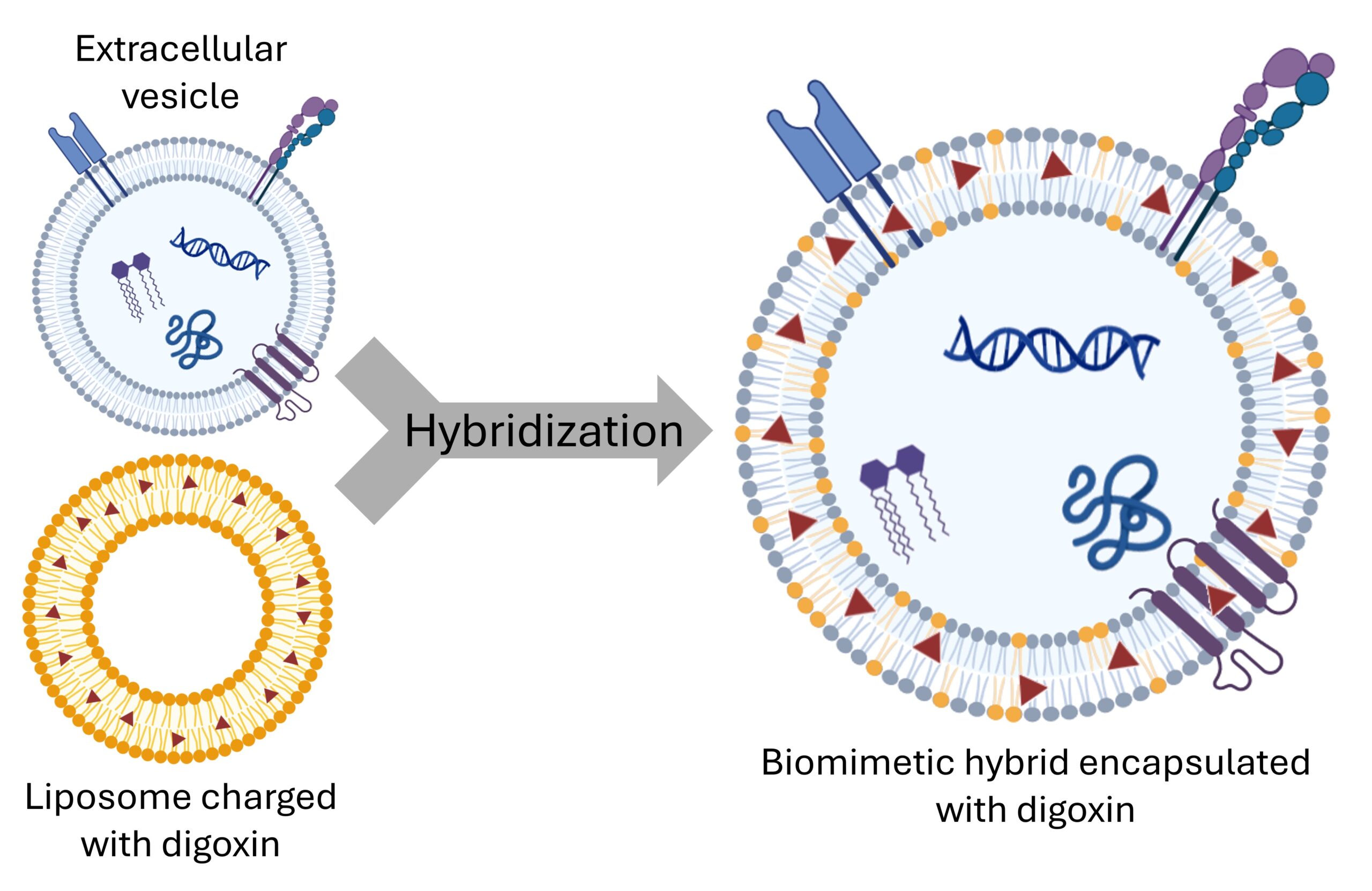 Foetal arrhythmia, an abnormality in the foetus’s heart rhythm, occurs in 1 to 2% of pregnancies. If left untreated, it can have various effects on the foetus, including heart failure, intrauterine growth restriction, neurological disorders and even death.
Foetal arrhythmia, an abnormality in the foetus’s heart rhythm, occurs in 1 to 2% of pregnancies. If left untreated, it can have various effects on the foetus, including heart failure, intrauterine growth restriction, neurological disorders and even death.
Currently, there are two approaches that can be considered for administering treatment to the foetus: transplacental administration, whereby high doses are given to the mother so that a fraction crosses the placenta, or direct administration into the uterus via the umbilical cord, a muscle or the abdominal cavity. Both methods pose significant risks to the mother and foetus, highlighting the need to develop new, less invasive and less risky therapeutic approaches.
Nanovectors appear to be promising therapeutic tools for targeting the placenta and delivering therapeutic molecules while controlling distribution in the mother’s body. This thesis project focuses on two types of nanovectors. On the one hand, liposomes, which are synthetic lipid nanoparticles offering high encapsulation efficiency. Second, extracellular vesicles (EVs), which are nanoparticles naturally produced by cells, with intrinsic targeting and physiological barrier-crossing properties.
Biomimetic hybrids can be obtained by fusing liposomes and EVs to combine the advantages of each vector. The aim of this project is therefore to develop hybrids that can be effectively loaded with digoxin, a drug commonly used in the treatment of foetal arrhythmia, while ensuring targeting of the placenta.
Benjamin LE ROLLAND: Lipid nanoparticles for targeted delivery of nucleic acids to treat pregnancy-related diseases.
Thesis supervisor: Karine ANDRIEUX
Funding: MTCI Doctoral School
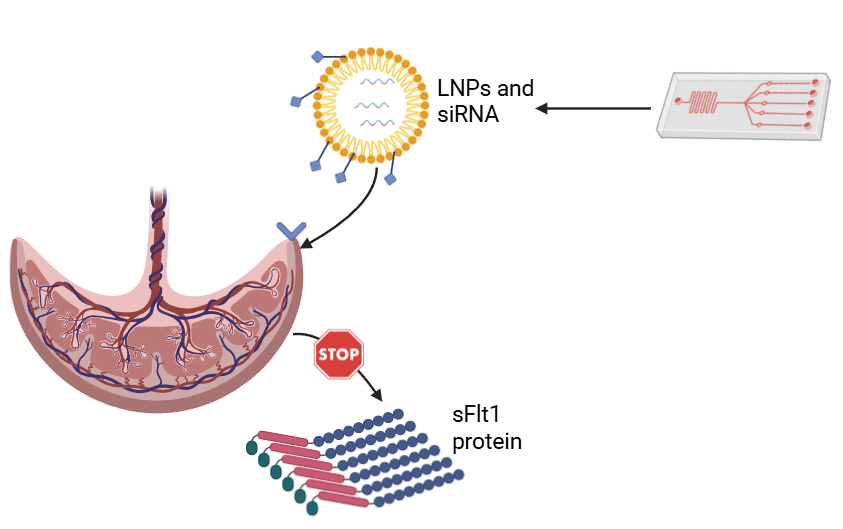 Nanovectors have potential for the targeted delivery of nucleic acids to pregnant women to treat placental diseases such as pre-eclampsia. The aim of this thesis is to develop lipid nanoparticles that complex specific nucleic acids and are decorated with ligands to specifically target the placenta by combining in vitro, ex vivo and in vivo evaluations with the aim of developing new therapeutic strategies for placenta-associated diseases such as pre-eclampsia.
Nanovectors have potential for the targeted delivery of nucleic acids to pregnant women to treat placental diseases such as pre-eclampsia. The aim of this thesis is to develop lipid nanoparticles that complex specific nucleic acids and are decorated with ligands to specifically target the placenta by combining in vitro, ex vivo and in vivo evaluations with the aim of developing new therapeutic strategies for placenta-associated diseases such as pre-eclampsia.
Ganesh MAMODALY : Testing of an oral mRNA therapy in vitro and in vivo to treat a rare digestive disease: Microvillus Inclusion Disease (MVID)
Team: Biotherapy
Thesis supervisor: Pascal Bigey
Funding: MSD Avenir Foundation, Cure MVID Association, LHF Espoir Association
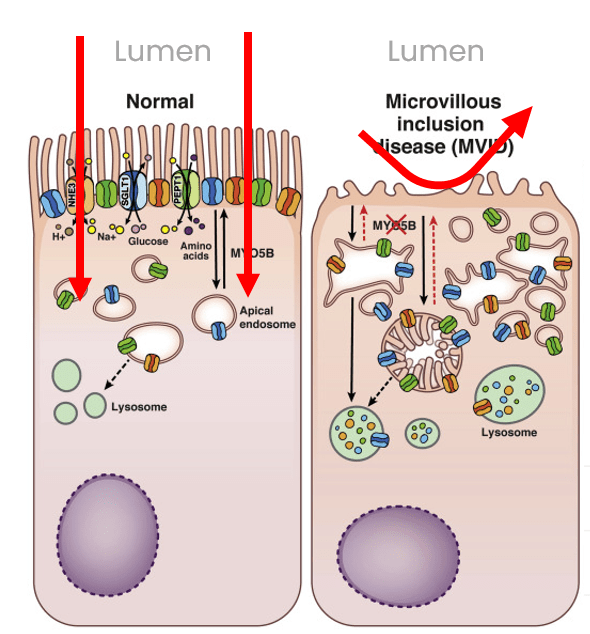 MVID is a rare genetic disorder that severely affects the small intestine, causing severe and chronic diarrhoea from the first days of life. This condition is caused by genetic mutations that disrupt the normal functioning of intestinal cells, preventing adequate nutrient absorption.
MVID is a rare genetic disorder that severely affects the small intestine, causing severe and chronic diarrhoea from the first days of life. This condition is caused by genetic mutations that disrupt the normal functioning of intestinal cells, preventing adequate nutrient absorption.
Patients with MVID often depend on total parenteral nutrition (TPN) to survive, which exposes them to serious complications such as recurrent infections, liver damage and a significantly impaired quality of life. The lack of a cure to date highlights the urgent need to explore new therapeutic approaches to improve the prognosis and lives of patients.
The aim of this project is to develop an innovative, orally administered mRNA therapy to reach intestinal cells and correct the underlying abnormalities of the disease.
The project presents major challenges, including the formulation of an ideal vector capable of protecting the mRNA from the hostile conditions of the digestive tract while allowing effective release in the intestine. In addition, the genetic mutations responsible for MVID disrupt intracellular trafficking in the intestinal epithelium, making transfection even more complex. In vitro and in vivo studies will assess the ability of these vectors to overcome these obstacles, with the aim of laying the foundations for future clinical development and offering a new therapeutic avenue for patients suffering from this rare disease.
À lire aussi
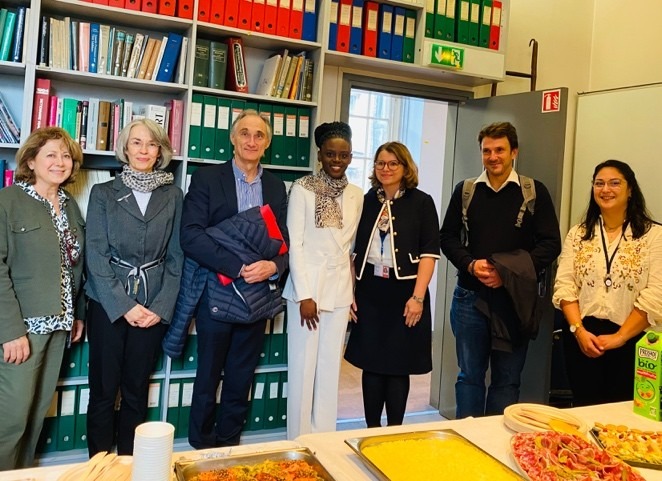
October 2025 – Thesis defense at UTCBS: Mitta PIERRE
On October 1st, 2025, Mitta PIERRE successfully defended her doctoral thesis entitled “Nanoformulations of antioxidant active ingredients for ophthalmic administration in the prevention of age-related macular degeneration (AMD)” supervised by Pr. Christine CHARRUEAU and co-supervised by Dr. Diana LAMAA
September 2025 – [Keynote research] Nathalie Mignet,Head of Laboratory, Nanomedicines and lipid nanoparticles for nucleic acid delivery
[Keynote research] Nathalie Mignet, Nanomedicines and lipid nanoparticles for nucleic acid delivery
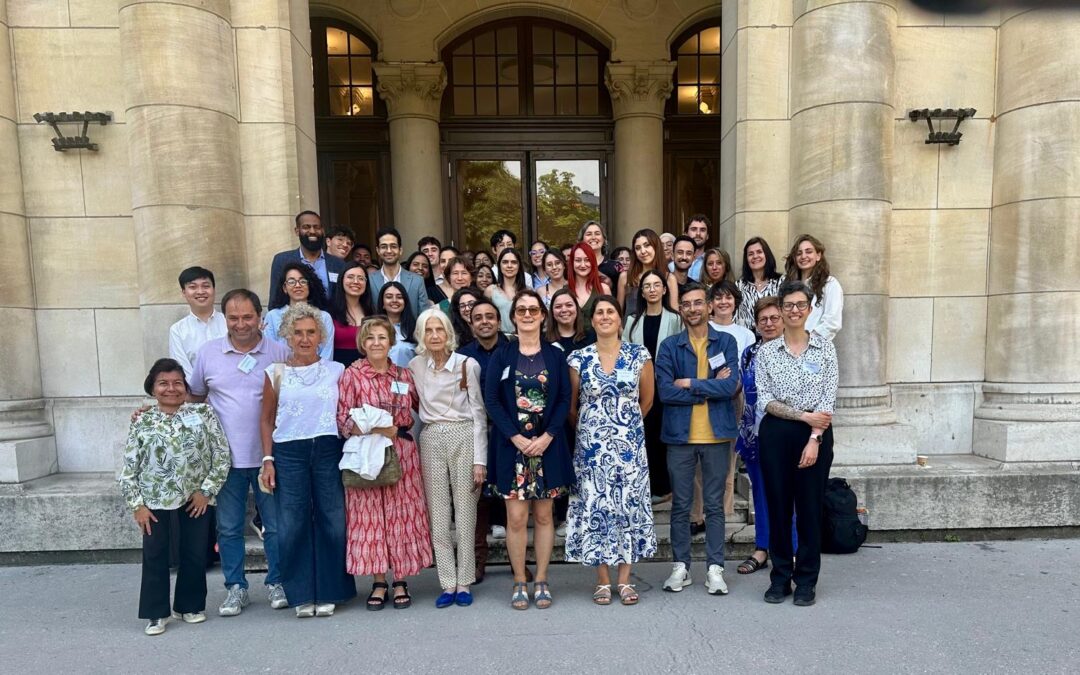
July 2025 – Workshop du master erasmus mundus Nanomed
Workshop du master erasmus mundus Nanomed
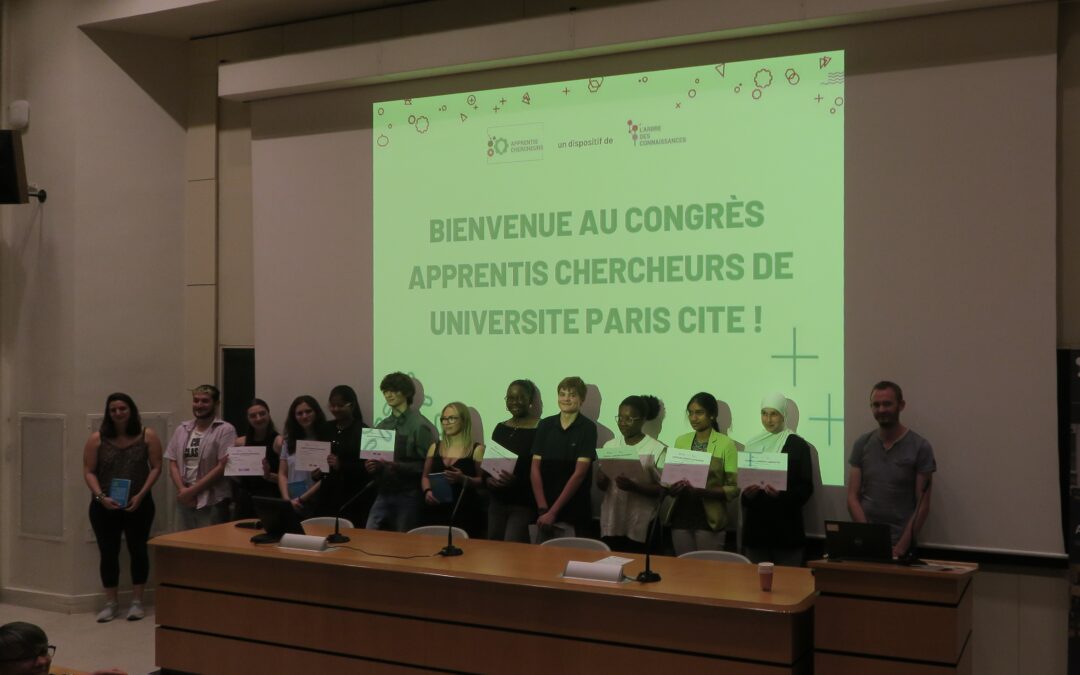
June 2025 – Université Paris Cité’s Apprentis Chercheurs conference was held last June, with UTCBS taking part.
Université Paris Cité’s Apprentis Chercheurs conference was held last June, with UTCBS taking part.
